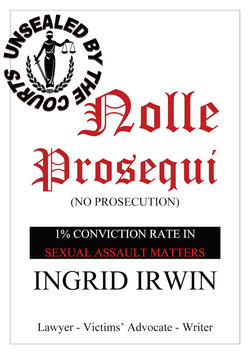Читать книгу Nolle Prosequi - Ingrid Irwin - Страница 1
На сайте Литреса книга снята с продажи.
ОглавлениеDefinitions
Nolle Prosequi – “be unwilling to pursue”
Nolle Prosequi essentially means “do not prosecute!” This old legal phrase means your case has been dropped. It is used by the Director of Public Prosecutions (DPP) when they use their prosecutorial discretion to drop all of the charges against a defendant and discontinue the case. This can happen in the early stages of a criminal case, during discussions with defence counsel, or at any time up to and including at trial before a verdict is given. It is also used in a civil context by plaintiffs who wish to not pursue their case any longer. This prosecutorial discretion of the DPP is absolute and completely unquestionable which means that if the police decide not to pursue the case anymore, whatever the reason, there is nothing that you as the complainant can do about it and the Notice of Discontinuance (called a Notice of Nolle Prosequi in the County and Supreme Courts) will be filed. Magistrates, Judges, the Attorney-General, the Ombudsman, IBAC, the Victims of Crime Commissioner, the Premier and state and federal politicians can’t do anything to assist you to get the police to keep the case running. The DPP simply has absolute power and authority in these matters. The DPP’s omnipotence has caused much injustice. For example, pursuing the charges of some complainants against a defendant whilst dropping other complainants who have made allegations against the same defendant in the same trial. The DPP decides who gets a chance at justice and who doesn’t. Technically speaking though, when a case ends in Nolle Prosequi (a discontinuance) this also means that the case can be brought back again whereby the same charges can be laid again against the same defendant in the future but it is highly unusual. This can happen when police think more witnesses (including victims) may come forward against the same defendant in time, and so prosecuting will be easier with anticipated corroborating evidence.
DISMISSAL – the act of ordering or allowing someone to leave
In a legal context, a dismissal arises after a judge or magistrate, upon hearing the evidence and becoming satisfied as to the defendant’s guilt, decides to dismiss some or all charges. This action may be based on the strength or lack thereof of the police case or because the charge or charges are considered to be so minor as to have little if any effect on the ultimate aggregate sentence imposed for other more serious charges. The charge is dismissed by an officer of the court (Magistrate or Judge) pursuant to section 76 of the Sentencing Act 1991 (VIC) and such a charge is found proved and then unconditionally dismissed without penalty.
DISCHARGE – the act of releasing a person unconditionally
Section 73 of the Sentencing Act in Victoria allows for an unconditional discharge, whereby a magistrate can discharge the matter, usually where charges are wrong or deemed minor such as being drunk in a public place and in all the circumstances, a penalty is considered to be completely inappropriate.
WITHDRAWAL – the act of withdrawing a charge
In a criminal matter, charges can be withdrawn by the OPP during pre-trial stages when they determine that there is not enough evidence to successfully prosecute on that charge.
